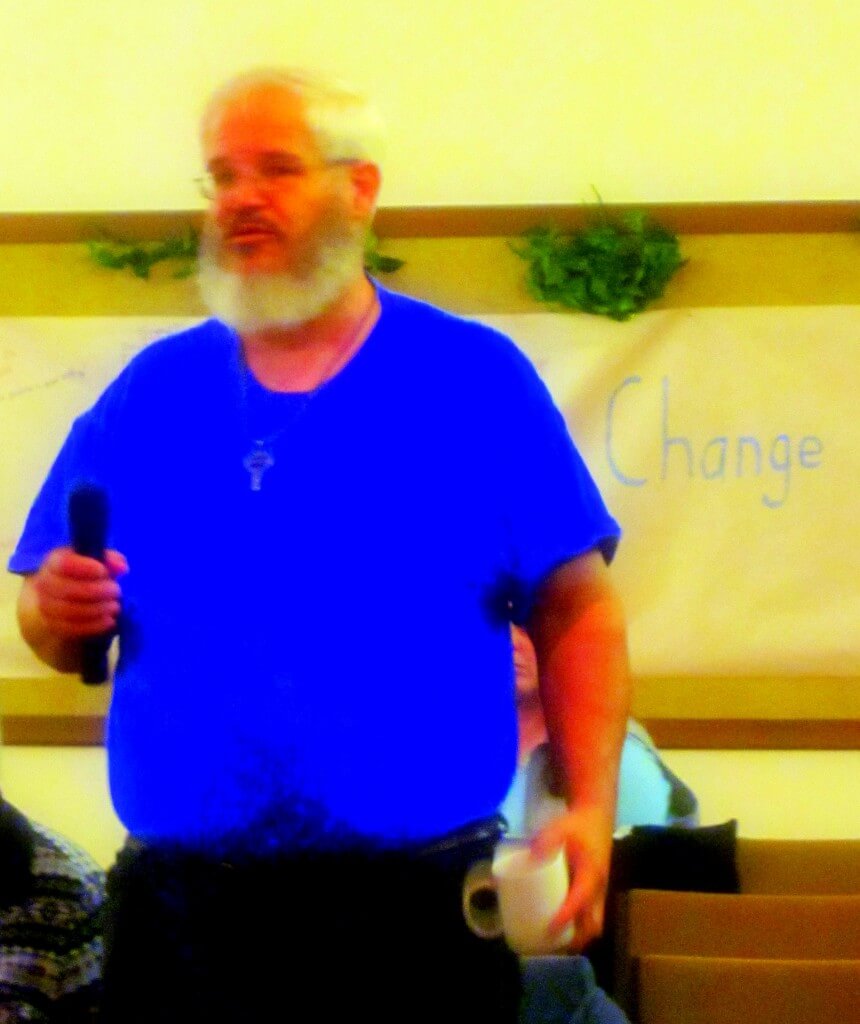-
Humanizing our Welcome
“Hello, this is Wonderful Redeemer Baptist Church.”
“Um… my name is Angie and I need to feed my children.”
“Well, we don’t have a food program here.”
“Could you recommend someone…”
“I’m sorry, but we can’t help you. Why don’t you try the government?”
“I can’t get any help from them now. I used up my opportunities.”
“Well, if they can’t help you, then we certainly can’t.”
“Could you give me a reference…”
“We don’t have any. Sorry. Goodbye.”
“But—“It is unfortunate, but conversations like this happen in churches every day in every city. Of course, we can only give what we have, but the real issue comes with how we speak, not just what we give.
Our technology has given us the ability to communicate to more people than ever before. But our use of technology has given us the ability to forget that at the other end of the phone or the internet is a real human being with real needs and desires and hopes just like we do. Our technology has given us a greater opportunity and excuse to dehumanize more people than ever before.
“Dehumanize” is kind of a technical term, so allow me the opportunity to explain it a bit. The Online Medical Dictionary defines Dehumanization as, “Loss of human characteristics; brutalization by either mental or physical means; stripping one of self-esteem.” Dehumanization is simply the reaction we have when we forget that another is a human being, and to treat them as a thing instead of a person who loves, struggles, dreams, sacrifices just like us. It is forgetting that just as we need respectful conversation, so do they. It is neglecting the fact that their needs are the equal of our own to be met. And most of all, it is forgetting that our Lord loves them just as much as He loves us.
There are two basic ethical principles by which we respond to others. The first is the one our Lord taught us, “Love your neighbor as yourself.” We are to give others the mercy, respect, forgiveness, grace and assistance we ourselves need. Not that which we deserve, but what we need, even as the Lord gives us grace we do not deserve. We all know this.
But the second principle works against this. This is the principle of security: “Protect your own against all others.” By this principle, we define some people as “neighbors” whom we love and some people as “others” whom we separate from, revile, spew hatred and, if they seem to be attacking our own, destroy.
 We recognize that our churches are not to be in the destruction business. But what we don’t realize is how we can destroy people’s spirits or humanity because we see them as the “other.” We may see someone as a reprobate, one who is hard of heart, one who is helplessly foolish or who simply isn’t as loving as we are. We may see the “other” in the one who takes or who desires what we have: our money, our possessions, or our time. We know this principle is at work when someone questions our actions toward another as too harsh and we respond with, “They deserve it.”
We recognize that our churches are not to be in the destruction business. But what we don’t realize is how we can destroy people’s spirits or humanity because we see them as the “other.” We may see someone as a reprobate, one who is hard of heart, one who is helplessly foolish or who simply isn’t as loving as we are. We may see the “other” in the one who takes or who desires what we have: our money, our possessions, or our time. We know this principle is at work when someone questions our actions toward another as too harsh and we respond with, “They deserve it.”The principle of Jesus to love gives no place to any principle which excuses dehumanization. We are never to think of another human being as the “other.” Our churches are constantly to represent the ministry of Jesus to all people, no matter who they are, no matter what they have done, no matter what they need. Should the worst child molester in the world show up at our doorstep, even if we were unable to help them, we should be kind to him, and refer him to someone who can help him.
Certainly, not every representative of our church is a counselor and not every church worker has time for everyone. A church secretary should not be required to listen to every story that takes him or her away from the work they are to do. The pastor should not have to take every phone call. However every church should be prepared to be kind and helpful to every need that walks in the door.
- The one who responds to people who are seeking help should have a list of resources that the church provides, including a person who will pray, a person who knows local resources, a person who can give wise counsel, and a person who will simply listen. And the pastor should not be the only person on this list.
- Every church should have access to a list of organizations that helps a variety of needs in their local area with ready access to phone numbers.
- We should all be asking the Holy Spirit to give us words of humility, comfort, encouragement and mercy, in accordance with the love of our Lord Jesus.
- We should all learn not to answer the phone or get on the internet when we are overly stressed or likely to lash out.
- We should all take personal retreats (even if only to our bedroom) when needed so we can be better ready to respond in accordance with the Spirit’s leading.
-
Angels To the Rescue
Around 3:30 this afternoon I was at the dollar store on Foster.
There was this very loud and obnoxious woman roaming through the store calling out this name and issuing threats. I came around the end of the isle and squatting between two displays was this little girl not more than 8 years old and she was praying quite fervently for Jesus to protect her from this woman. About the same time the loud woman came around the other side and was attempting to grab her and I stopped her.
“Who do you think you are?” she bellowed.
Looking at the little girl I said, “Her protection from you. You see, she was praying to Jesus to provide her with protection from you and I…well I work for Jesus the Christ. So, are you her mother?”… and the girl says quickly “NO! She is a neighbor.”
“Did your Mom ask her to watch over you?”
“No.”
Now the loud and obnoxious woman is looking like she wants to grab the girl again but the little girl puts her hand in mine and steps behind me.
Well while this was all going down, Mark the Manager has been on the phone and is escorting a couple of Portland’s finest to the isle. The neighbor sees the cops and bolts but doesn’t get far. It seems that the neighbor doesn’t like kids and likes to scare and torment them. She has been warned before, but today’s adventure gets her arrested.
After the excitement subsides a little I learn that my charge is named Maria. I get to call Maria’s mother, who comes to the store to pick up her daughter.
When Maria’s mom shows up, Maria says, “Momma it worked just like you said.” It seems that Maria had only become a Christian with her mother about 6 months ago and her mother had told her that if she was ever in need of a protector Jesus would provide one. And it seems He did. Actually 2 of them, for Mark is a brother in Christ also.
But is that not the way of the Lord when he is pouring out a blessing? Pressed down and over flowing……
-
The God Who Sees

The very first recorded appearance of an angel is to an abused slave.
Hagar learned that God sees the plight of the oppressed and suffering and does something about it.
-
Looking Like the Bride of Jesus
 When we first started living in community, we invited our friends who had just moved in the area to come to church with us. One of our friends, Marcy, gladly accepted a ride to church, and attended, hoping to have a community she could connect with. That hope prevailed, although she attended the church for years, and reached out to many and got involved, yet she didn’t have the friends, the community she desired. She was smart and articulate and funny, but many people couldn’t see that because she had a lazy eye and thick glasses.
When we first started living in community, we invited our friends who had just moved in the area to come to church with us. One of our friends, Marcy, gladly accepted a ride to church, and attended, hoping to have a community she could connect with. That hope prevailed, although she attended the church for years, and reached out to many and got involved, yet she didn’t have the friends, the community she desired. She was smart and articulate and funny, but many people couldn’t see that because she had a lazy eye and thick glasses.We of the church recognize that we are supposed to be a unique people. All too often, though, we misunderstand what that strangeness is supposed to be. Often we consider our uniqueness to be holiness (although it is difficult to find a uniquely holy congregation, honestly), or perhaps our love for one another. And while these aspects may be significant, the congregation Jesus had in mind was even more unique.
When talking about the make-up of his people, Jesus said that his people are to be “poor” “mourning” “persecuted” “meek” “hungry” and even hated and ostracized. These are the blessed of God, the recipients of salvation, the ones in need of deliverance. A couple of these terms Jesus is borrowing from the Hebrew Scriptures, which are translations of the word “anawim”.
Anawim is a term that is used frequently in Psalms and Proverbs and the prophets to speak of the lowly and poor who are seeking the Lord for deliverance. The anawim are those who face the most difficult social crises: poverty, rejection, hatred, and can turn to no one but the Lord for deliverance from their problems. The anawim are the outcast, those hated by society, yet still they do all they can to remain faithful to the Lord.

Not the church of Jesus
But our churches are often monuments to those who are socially accepted, to those who have it made. We are not seeking to cater to a particular group, necessarily, but since those who have the power and wealth to make a community have… well, power and wealth, then the outcast and hated and poor aren’t so much rejected as neglected. We find that without thinking about the anawim, we have created no place for them. We put our churches where public transportation cannot go. If someone admits that they can’t afford to go to the church retreat, we will treat them like charity, making them give personal information we might not require of others. Church business is done at meetings in restaurants the poor aren’t invited to and they couldn’t afford. Our worship focuses on the functionally literate, those who sing well, or who can see the words on the screen. We dress well, not thinking about how uncomfortable we will make those who cannot dress as we dress.
And so the anawim don’t feel comfortable in our congregations. It isn’t anything we said. We may have tried our best to be welcoming. We may have given them a central spot and asked them to stand up and tell everyone in the church who they were. But culturally, we are giving a message that they are welcome IF they become like us.
More congregations—not all, but more—need to consider how to best welcome the anawim of their neighborhoods. Perhaps some would rather have a church service that wasn’t located in a church sanctuary. Perhaps some would come, if a meal was offered before the service. Perhaps a number of people in the church could “dress down” to reflect the people Jesus said were blessed.
In order for us to welcome the anawim, we must change culturally to be like them, not assume that our cultural standards are everyone elses’.
If we do welcome the anawim, we may find our culture changing more than we like. We may find that we are driving away others who can’t deal with the stress of a cross-cultural congregation. We may even find our congregation sounding like this, but this is the cost of having a Jesus-like church. I’m sure it wasn’t the most orderly meal when Jesus ate with the sinners and tax collectors, either.
If you would like to take a test to see how close you come to being Anawim, or if you would like to find out more about Anawim, please check out this article
*These terms are all taken from Jesus’ beatitudes, found in Matthew 5:3-12 and Luke 6:20-24.
**The term “poor in spirit” used in Matthew 5:3 is borrowed from Proverbs 16:19; The phrase “the meek shall inherit the earth” is from Psalm 37:11. The words “humble” “poor” and “meek” in these passags are all translations of the Hebrew word “anawim”.
-
Draw Me Into You
This is an original song we sing at Anawim:
Chorus:
Lord, lead me out of me
Draw me into You
Help me set aside my wants
Draw me into You
Free me from depression
Free me from apathy
Free me from obsessions
Free me from all my pain
Free me from deception
Free me from speech untrue
Free me from frustration
Draw me, Lord, into You
Chorus
Make in us humility
Make in us holy wills
Make in us your mercy
Make in us pure clean hearts
Make in us your unity
Make in us faithful truth
Make in us your charity
Draw us, Lord, into You
Chorus
3733 N Williams Ave
Portland, OR 97227
503.888.4453
AnawimCC@gmail.com
Ministry Locations and Times »













